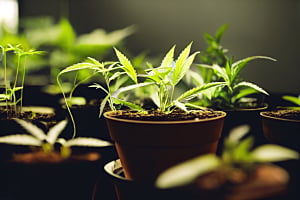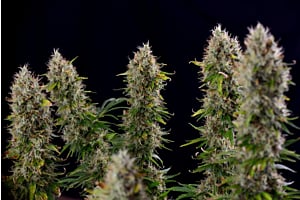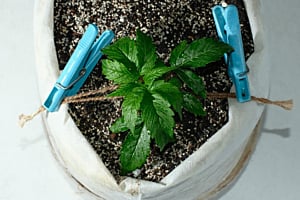Contents
Pros and cons of organic compost
Pros and cons of commercial compost
Why choose organic compost over commercial
How to make your own compost for weed growing
Potential problems with compost
Organic compost: Turning waste into black gold
Did you know you can prepare your own compost for cannabis home growing? You donߴt have to rely on chemicals to cultivate your marijuana when all you need is in your garden and kitchen trash.
Organic compost is a simple, inexpensive, and eco-friendly way to nourish your soil and give your crop a healthy habitat.
Read on to learn what constitutes wholesome composting, ingredients to avoid, and how to care for your organic matter. Discover the pros and cons of different composting options and why we recommend organic options.
Let’s get started.
Pros and cons of organic compost
As a popular growing medium for cannabis, soil quality remains a central player in successful cultivation. It provides a bed for valuable minerals while simultaneously supporting different life forms. Beneficial plant microorganisms make their habitat here.
As a complete ecosystem, ensuring your soil stays rich and healthy is imperative to sustaining the microbes. Applying organic compost is effective toward this end.
This natural addition benefits you, your crops, and the environment differently. Here are the top benefits to consider:
- Acts as an organic slow-release fertilizer, reducing the risk of plant burns that are common with chemical fertilizers
- Improves soil texture while augmenting air circulation
- Boosts the soilߴs nutrient profile for increased plant size and higher yields
- Saves money for purchasing new compost and soil
- Helps convert free waste and particles into valuable substances
- Enhances soil moisture retention
- Supports optimal cannabis plant growth
- Lowers carbon footprint
The few drawbacks associated with organic cannabis compost are:
- It relies on microorganisms to decompose and release nutrients into the soil. These creatures need moisture and warmth to be effective. If the earth is deficient, the decomposition takes time and has limited effects.
- Organic compost takes up to several months to break down and acclimatize into the soil before the results show. While there aren’t overnight outcomes, your cannabis plants will reward your patience through decent yields and potent buds.
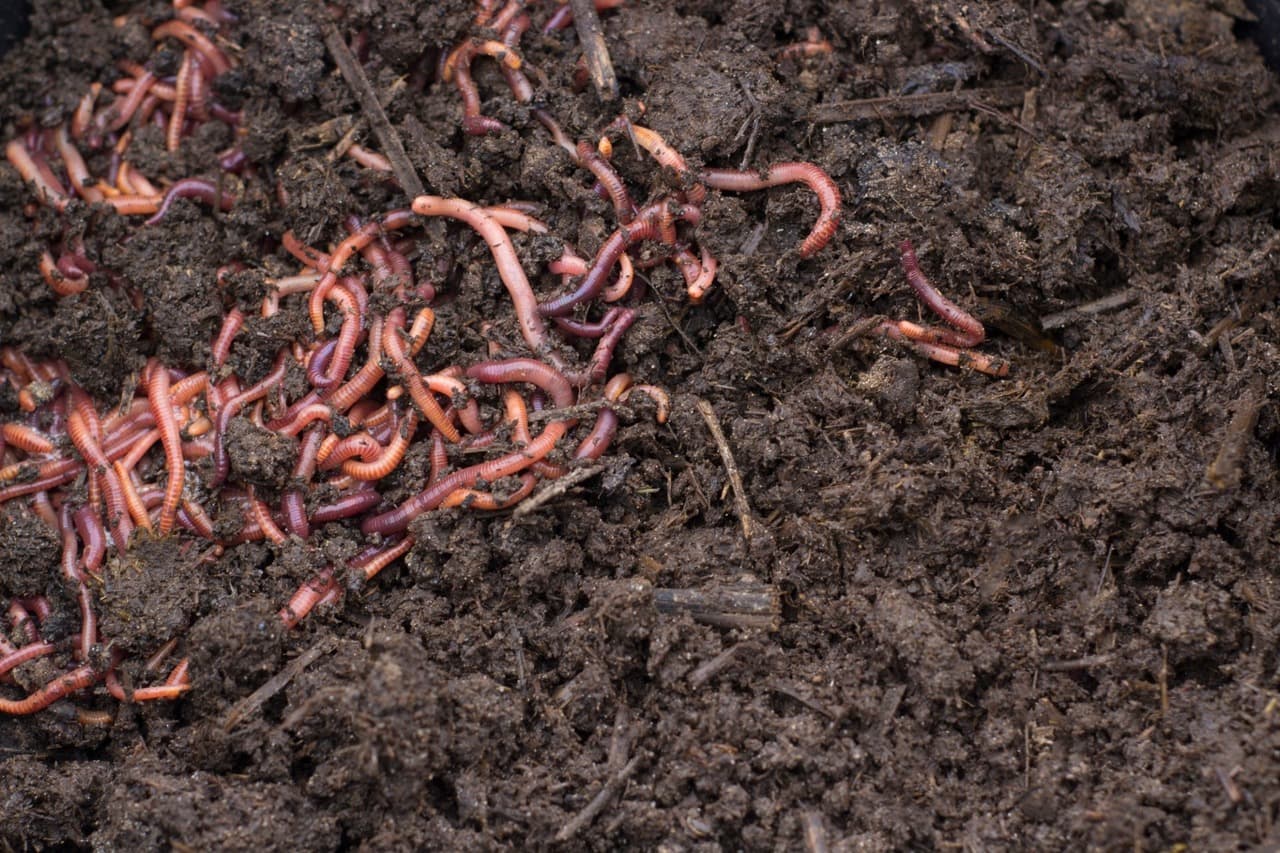
Pros and cons of commercial compost
Industrial or commercial composting deals with higher organic waste volumes than homemade alternatives. It entails gathering trash from households, restaurants, and grocery stores and then producing compost for sale to individuals or nurseries.
Here are the benefits if you’re considering this option to produce quality yields from top-shelf high THC seeds:
- It’s ideal for large quantities and covers expansive grow spaces with consistent concentrations.
- The compost is readily available, and you donߴt have to wait months for complete treatment.
- It produces nutrient-rich matter thanks to enhanced temperature, moisture, carbon, and nitrogen control.
Here are some downsides to commercial compost:
- It’s more expensive than homemade compost because of varying ingredients across different manufacturers.
- It’s hard to tell what goes into the compost (added chemicals and fertilizers) and determine the expected outcome as it’s delivered readymade.
- It’s time-consuming as you have to try different brands to find the one that works best for your plants.
- If the demand is high, some composting companies may not give the organic matter enough treatment time, placing your crop at risk.
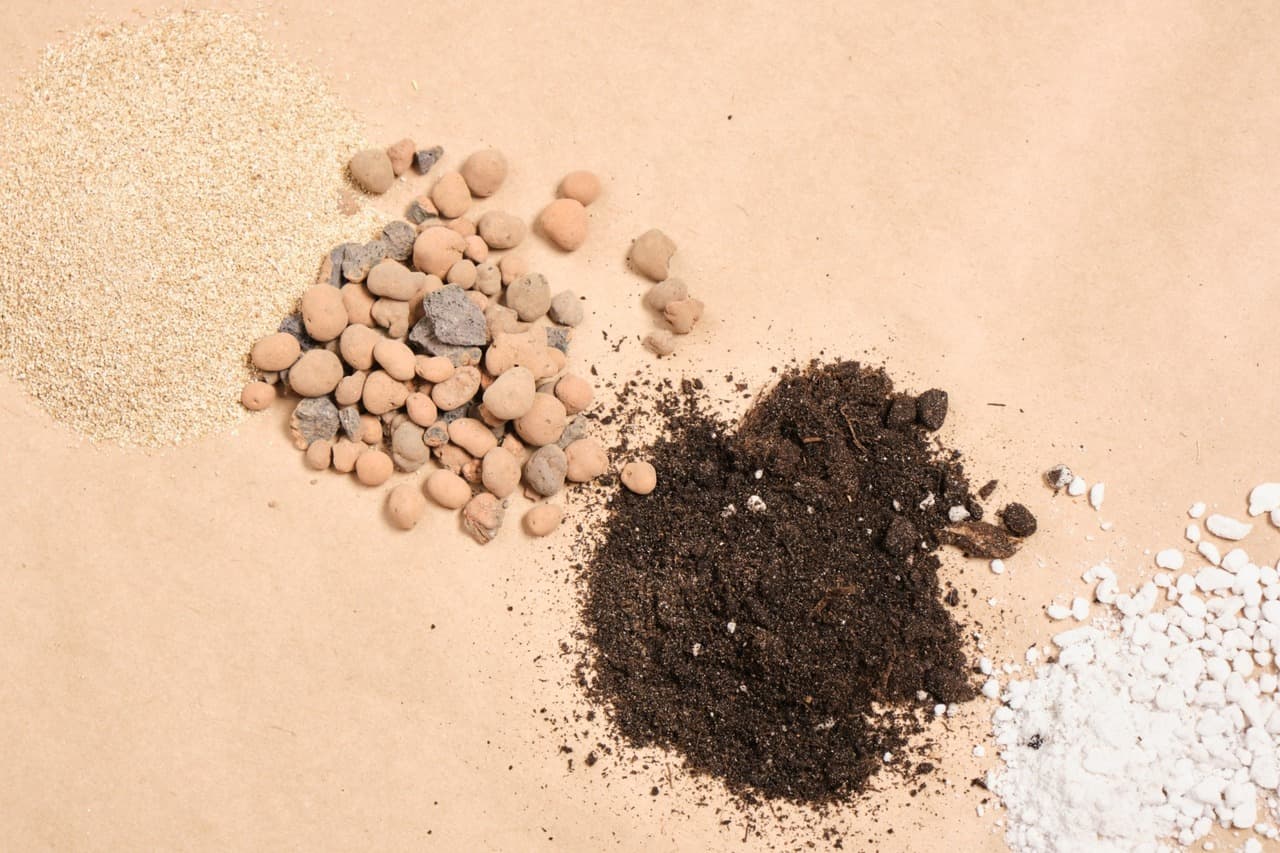
Why choose organic compost over commercial
Homemade organic matter, such as mushroom compost for weed, offers an inexpensive, eco-friendly solution for growing cannabis seeds in healthy soil.
We recommend this option because it allows you to create a natural cycle of turning waste into useful material. This system helps reduce the amount of trash released to landfills and recycling centers while minimizing the compost you have to purchase.
Organic matter means your marijuana plants will only absorb the nutrients they need rather than potentially harmful chemicals. It costs you nothing, as everything you require is already available at home, so it’s a win-win.
Making organic compost for your home grow is a no-brainer, and maintenance is easy. Enriching the soil eliminates the risk of pest and disease infestation without using synthetic products.
How to make your own compost for weed growing
Organic nutrients for growing cannabis play a vital role in enriching your garden soil for top-shelf buds. Applying DIY mushroom compost for cannabis is one of the most rewarding additives to your growing medium, but what about preparation?
Creating your own organic matter starts with making or buying a compost bin to keep your heap safe, warm, and moist. These three factors help sustain microbial life for seamless decomposition.
The next item on the agenda is finding a suitable garden spot to place the container. Preferably, opt for a shady area shielded from strong winds and storms.
Compost microbes thrive best under consistent conditions, so avoid locations susceptible to too much heat during summer.
For optimal results, try to place your bin directly on an earth base like mud or grass. This situation allows worms to ascend the container and decompose organic matter while ensuring proper drainage.
Ingredients for compost
The best compost for cannabis entails brown and green organic materials to complement the ideal soil for growing weed.
Your heap needs the proper amounts of each to help the microbes stay healthy and thrive. Too much of either matter leaves you with an imbalanced pile that’s extremely wet (and stinky) or dry (and inefficient).
The ideal material ratio should range from 25–50% for green and 50–75% for brown matter in your compost heap.
The former boasts rich nitrogen content. These materials provide moisture while supplying food to the beneficial fungi and bacteria responsible for decomposing matter into compost. The latter helps absorb excess moisture while delivering carbon to the heap.
The green materials to use are:
- Vegetables and fruits
- Seaweed
- Grass clippings
- Animal manure
- Tender, leafy plants
- Raw kitchen waste such as potato skins, banana peels, and carrot trims
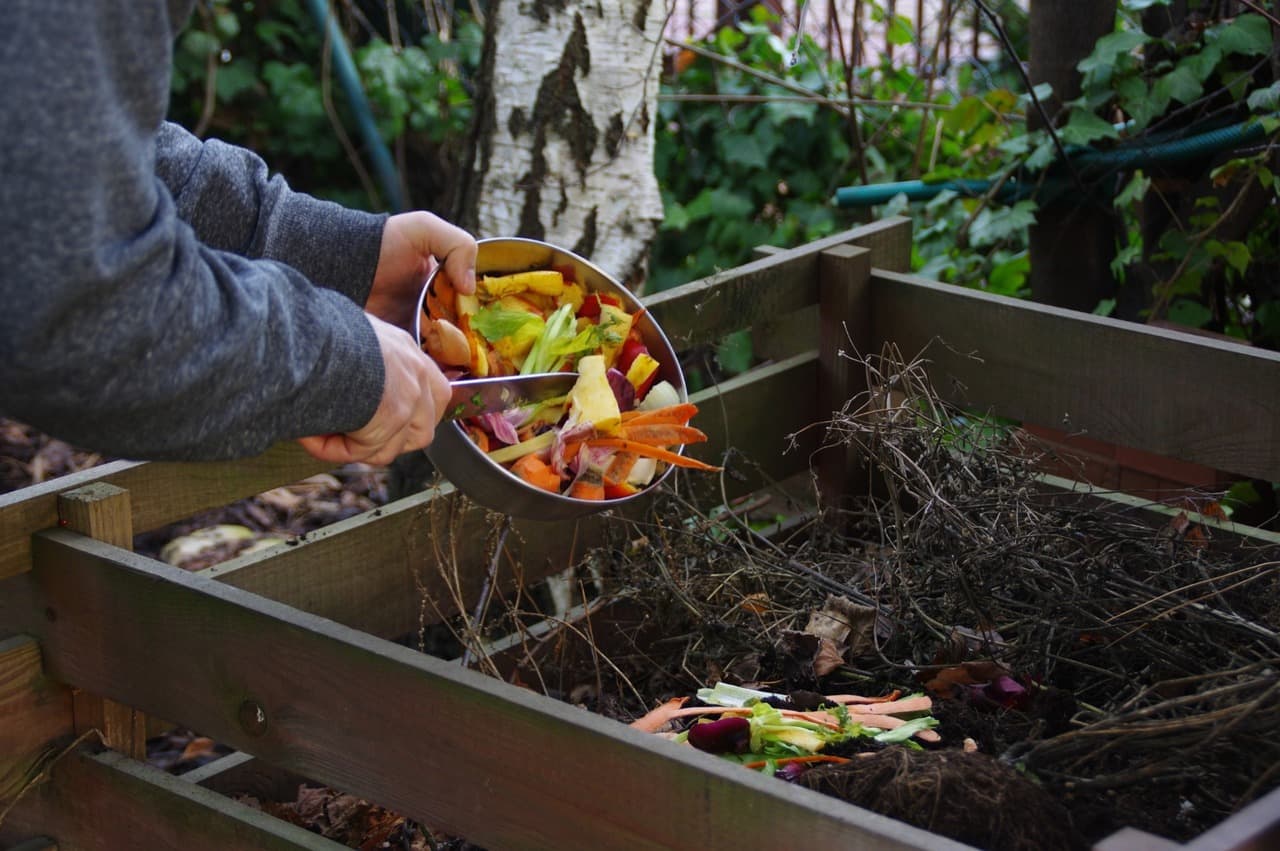
The brown materials to use are:
- Straw
- Dead leaves
- Egg cartons
- Wood chips and sawdust
- Cardboard
- Sticks and pruned twigs
- Used animal bedding
As much as you want to use most of your garden and kitchen trash for composting, some items aren’t ideal candidates. If added to the heap, they may be detrimental.
Here are the substances to avoid in your compost bin:
- Dairy
- Meat
- Cat and dog waste
- Pernicious weeds
- Fat
- Coal ash
- Diseased plants
Maintaining a compost heap
Incorrectly caring for your composted materials may cause odors, weed growth, pests, disease, and slow decomposition. Marijuana compost doesn’t need a lot of work except occasional turning and providing the required substances for well-balanced components.
Turning is essential for speeding up the composting process. It helps aerate the organic matter to facilitate faster decomposition. Preferably, go at it using a pitchfork every few weeks and restore the materials into a neat pile afterward.
During dry periods, you may need to add water to the compost pile to keep the materials damp. Make sure not to saturate the heap, as the aim is to keep it reasonably moist, not soggy.
Should it get too wet, add more brown matter to soak up excess moisture or turn it more frequently.
Potential problems with compost
As you contemplate how to deal with pests on cannabis plants, note that it’s not the only problem that concerns you.
Sometimes attaining the best compost for weed growth becomes elusive if there’s a material or environmental imbalance.
Here are the potential issues to keep an eye on.
Wet, slimy, and smelly compost
An ideal compost pile boasts aerobic microbes to help with decomposition, but these only thrive
in the presence of air. A healthy amount of brown matter helps absorb excess moisture and produces oxygen-rich pockets.
On the other hand, too much green matter results in excessive moisture buildup and oxygen reduction, creating anaerobic conditions. This deficiency leaves room for other microbes that thrive without oxygen to degrade the heap.
As such organisms can’t break down materials fast enough, they turn your pile into a smelly sludge. The best solution is to introduce more brown matter to develop air pockets and soak up the slime. Turning from time to time also helps.
Dry, fibrous compost
A dry, fibrous compost is the direct opposite of a wet scenario. This pile contains adequate oxygen but lacks enough water, nitrogen, and nutrients to support fungi, bacteria, and worms.
The best fix is to add more green matter (to match the brown) and compost accelerators to restore a healthy balance.
If your compost bin sits on gravel or concrete, adding worms helps speed up the degradation of the materials. It’s also ideal for distributing nutrient-rich worm castings.
Fly infestation
A healthy compost for weed shouldn’t attract swarms of flies as this might signify anaerobic decomposition. The best solution is adding more brown matter and turning the pile.
The fly infestation could be a result of exposed kitchen waste. To remedy the problem, cover the litter with a sawdust layer as soon as you add it to the pile.
Organic compost: Turning waste into black gold
Growing weed at home doesn’t have to be costly, stressful, or harmful to the environment. Use natural methods like organic compost for a constant nutrient supply, healthy plants, and enhanced yields.
Check how much garden and kitchen waste you send to landfills and redirect it to enrich your soil. This decision substitutes the cost incurred for expensive synthetic fertilizers without eroding your crop’s quality.
Keep a keen eye on the potential problems of organic compost and the best maintenance techniques to reap maximum benefits. If you’re unsure how to start your home grow, visit our blog for easy-to-follow guides.

 THC
THC


